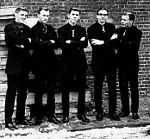The Monks, referred to by the name monks on record sleeves, were an American rock band formed in Gelnhausen, West Germany, in 1964. Assembled by five American GIs stationed in the country, the group grew tired of the traditional format of rock, which motivated them to forge a highly experimental style characterized by an emphasis on rhythm over melody, augmented by the heavy use of distortion. The band's unconventional blend of shrill vocals, confrontational lyrics, feedback, and guitarist David Day's six-string banjo baffled audiences, but music historians have since identified the Monks as one of the most innovative rock bands of their time. The band's lyrics often voiced objection to the Vietnam War and social alienation, prefiguring the harsh and blunt social and political commentary of the punk rock movement. The band's appearance was considered as shocking as their music, as they attempted to mimic the look of Catholic monks by wearing black habits with cinctures symbolically tied around their necks, and hair worn in partially shaved tonsures.
In late 1964, while known as the Torquays, the band issued the self-financed single "There She Walks"; however, the release barely hinted at the music the group would record the following year. With the help of a German management team, they decided to change their name to the Monks and released the "Complication" single to coincide with the distribution of their one and only studio album, Black Monk Time, in May 1966 via Polydor Records. Though the album and additional singles issued throughout 1966 and 1967 achieved limited success at the time, they have since become highly regarded amongst music enthusiasts and commentators.
A few days after the release of the compilation album Five Upstart Americans in 1999, all five of the original band members held a reunion concert at the Cavestomp festival in New York City, followed by sporadic touring in the 2000s. The band has acquired a cult following as a result of the newfound interest in Black Monk Time and appearances on several compilations, most notably the 1998 expanded version of Nuggets: Original Artyfacts from the First Psychedelic Era, 1965–1968. Punk rock bands and acts of other genres from the 1980s and 1990s, such as the Dead Kennedys, the Fall, and Beastie Boys, have credited the Monks as an influence on their music. (Full article...)
